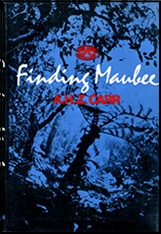Mon 7 Nov 2022
A Mystery Review by Tony Baer: A. H. Z. CARR – Finding Maubee.
Posted by Steve under Reviews[5] Comments
A. H. Z. CARR – Finding Maubee. Putnam, hardcover, 1971. Bantam, paperback, 1973. Edgar Winnerin 1972 for Best First Mystery. Film: MGM, 1989, as The Mighty Quinn (reviewed here ).

So aside from the fact that I’m into American mid-century hardboiled writing, when looking for my next read, one of my rules of thumb is to target books that somebody somewhere that I respect has endorsed. Life’s too short for me to read everything. And it’s especially too short to waste what little time I have reading crap. Reading nourishes me and helps me to keep going. These (generally) dead writers are my friends. We understand each other. And if someone cool has read a mid-century hardboiled book and enjoyed it, then I figure I should be also capable of experiencing similar enjoyment. If I fail to experience similar joy the failure is all mine. It’s not like anyone is paying me to read books — it’s me that paying for the privilege with my money and my time. I read for the experiences a book provides me with and the time I get to spend in the author’s company. And if the experiences are not valuable, it’s my loss and mine alone.
There’s a number of lists out there from which I draw (James Sandoe and Geoffrey O’Brien, for example). Another nice list of books comes courtesy of J. Kingston Pierce’s much beloved blog The Rap Sheet:
http://therapsheet.blogspot.com/2007/05/ones-that-got-away.html.
Robert Randisi’s choice of the most criminally neglected novel was Finding Maubee:
“I choose Finding Maubee, by A. H. Z. Carr. When it came out in 1972 it won the Edgar for Best First novel. [It’s] a procedural set in Jamaica, which was made into an enjoyable 1989 movie with Denzel Washington, called The Mighty Quinn. Unfortunately, before [Carr] could write any more, or–I believe–even before the book was published, the author died. … I would have loved to see what this author would have done next.â€
http://therapsheet.blogspot.com/2007/05/youre-still-one-part-iv.html
It’s quite pricey, but I was able to read it via the indispensable Internet Archive:
https://archive.org/details/calypsomurders0000carr.

The book centers around the relationship between the police chief, Xavier Brooke, and his childhood friend David Maubee. Maubee is a famous local Don Juan, who has fathered so many children out of wedlock that he has taken to petty theft to pay all of his paternity obligations. He’s so legendary that the islanders of the fictional American Island St. Caro sang a calypso that goes:
“Let us tell you the story of David Maubee,
Who sought for a life of tranquilitee.
He had to pay money to eight different women,
So now he robs tourists while they are swimmin’.
He have found the way of life which is safest and surest—
Like all of us here he live on the tourist.â€
The police left Maubee alone in his gigolo induced petty thievery because local sentiment was on his side. Another popular calypso goes:
“Police don’ wan’ get Dave Maubee sore
Cause provocation is against the law.â€
The uneasy truce between the police and David Maubee comes to an end, however, when a rich American industrialist is found slain by a machete bearing Maubee’s fingerprints, Maubee’s little black book laying by the slain man’s side.
The American governor of the island, Governor Chalk, has ordered the police to arrest Maubee at once. Dead or alive. No autopsy necessary. We can’t have this island tourist destination soiled by the scandal of unsolved murder of rich American tourists.
Ignoring orders, and at the risk of hearth and home, Police Chief Xavier Brooke has an autopsy performed. It turns out that the victim was poisoned to death before the staged slaying.
Governor Chalk won’t believe the autopsy, however. And he gives Xavier 24 hours to catch Maubee and/or prove someone else is the murderer. If he doesn’t solve it in time, Xavier’s chief deputy has Chalk’s ear, with knives out to take Xavier’s job (and wife) from him.
It’s a very enjoyable Caribbean detective story. A bit reminiscent of the Jo Gar stories for the island atmosphere and the gentility and cultured manners of the local police chief who navigates local customs and superstition with the finesse necessary for native cooperation.
It gets a bit too talky at the end, where we have the tired mechanism of having all the suspects show up in one room to finagle a confession. But I can forgive this cliched ending for what, prior to the denouement, was an original, touching story of an unlikely friendship between law and outlaw outlasting hypocritical colonialist efforts to subvert a difficult justice in the interests of tourism.
November 7th, 2022 at 10:05 am
I read this one close to 50 years ago and enjoyed it quite a bit. My wife is a huge fan of the movie with Denzel Washington and Robert Townsend, plus James Fox, Mimi Rogers and M. Emmett Walsh.
November 8th, 2022 at 1:56 am
What I wonder is why this book is so hard to find. There are no copies of the paperback to be found on abebooks.com, for example, and only two of the hardcover, both in the $350 range.
November 8th, 2022 at 6:18 am
It was The Calypso Murders in the UK.
Don’t know if it’s any more common.
November 8th, 2022 at 6:20 am
Whoops!
Just noticed you referred to it under that name at Internet Archive!
November 8th, 2022 at 7:59 pm
I’m a fan of book and movie. Carr wrote some very good shorts for EQMM as well as this novel and it really is a shame there is only this one, but it is so good it is hard to see that as a tragedy. Most writers would kill to write one book this good however much I would have liked to see Xavier Brooke in more adventures.